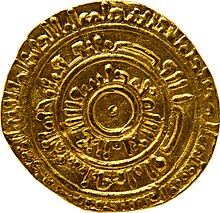
Back نزار المصطفى لدين الله Arabic Nizar ibn al-Mustànsir Catalan Nizār ibn al-Mustansir German Nizar ibn al-Mustansir Spanish نزار بن المستنصر Persian Nizar ben al-Mustansir French Nizar bin al-Mustansir ID Nizār ibn al-Mustanṣir bi-llāh Italian ニザール・ブン・アル=ムスタンスィル Japanese Nizar Ibn al-Mustansir Polish
Nizar ibn al-Mustansir | |
|---|---|
 Gold dinar minted in the name of Nizar at Alexandria in 1095 | |
| Born | 26 September 1045 Cairo, Egypt |
| Died | c. November/December 1095 (aged 50) Cairo, Egypt |
| Cause of death | Immurement |
| Title | Imam of Nizari Isma'ilism |
| Term | 1094–1095 |
| Predecessor | al-Mustansir Billah |
| Successor | Ali al-Hadi (in concealment) |
| Father | al-Mustansir Billah |
| Family | Fatimid dynasty |
| Part of a series on Islam Isma'ilism |
|---|
 |
|
|
Abu Mansur Nizar ibn al-Mustansir (Arabic: أبو منصور نزار بن المستنصر, romanized: Abū Manṣūr Nizār ibn al-Mustanṣir; 1045–1095) was a Fatimid prince, and the oldest son of the eighth Fatimid caliph and eighteenth Isma'ili imam, al-Mustansir. When his father died in December 1094, the powerful vizier, al-Afdal Shahanshah, raised Nizar's younger brother al-Musta'li to the throne in Cairo, bypassing the claims of Nizar and other older sons of al-Mustansir. Nizar escaped Cairo, rebelled and seized Alexandria, where he reigned as caliph with the regnal name al-Mustafa li-Din Allah (Arabic: المصطفى لدين الله, romanized: al-Muṣṭafā li-Dīn Allāh). In late 1095 he was defeated and taken prisoner to Cairo, where he was executed by immurement.
During the 12th century, some of Nizar's actual or claimed descendants tried, without success, to seize the throne from the Fatimid caliphs. Many Isma'ilis, especially in Persia, rejected al-Musta'li's imamate and considered Nizar as the rightful imam. As a result, they split off from the Fatimid regime and founded the Nizari branch of Isma'ilism, with their own line of imams who claimed descent from Nizar. This line continues to this day in the person of the Aga Khan.